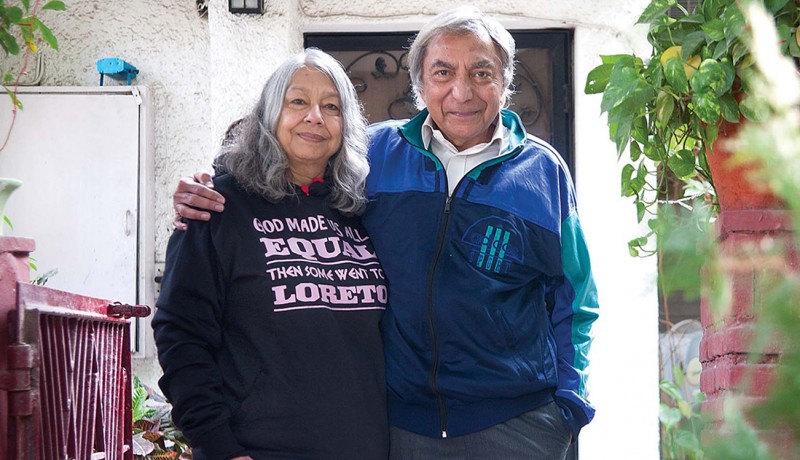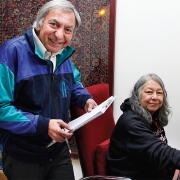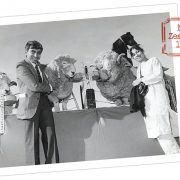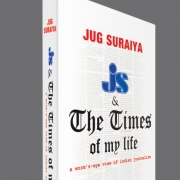
People

The Suraiyas emanate a sassy charm laced with saucy chemistry, finds Natasha Rego.
The Writers: Bunny Suraiya, 69, & Jug Suraiya, 70
Married: 48 years
Bunny and Jug… no, they do have formal names but neither answers to them—that would be almost sacrilegious. Can you imagine one of India’s most celebrated satirists signing off as ‘Jagdish Chatrabhuj Suraiya’? Jagdish, Chatra…who? Yeah, we told you!
It’s 3 pm on a Monday afternoon when we speak to the Suraiyas over the phone. They are at their row house in Gurgaon, where they have been living for 20 years. The walls, we hear, are filled with exquisite art from their many travels, which is all Bunny’s doing, while the floors in every room are adorned with a carpet. The carpet culprit, Bunny says, is Jug! “If I spot a carpet shop, I have to quickly guide him past it, or he will end up spending hours examining the carpets and speaking to the carpet seller.”
The Suraiyas are just finishing their daily ritual of solving the cryptic crossword of The Times (London). Bunny downloads and prints two copies from The Telegraph for each of them every day; working the computer and printer is her forte, for Jug is a sworn paper-and-pen kind of fellow. She has just one clue gnawing at her, which she eventually nails. “Jug has a few more left,” she chuckles.
Words, words and more words have come to define the Suraiyas. Jug, as many Indians know, is never at a loss for them. He has long been satirist-in-chief at The Times of India, an author many times over and, with his acerbic wit, made a career of getting on everyone’s nerves—from Amitabh Bachchan and Shobhaa De, to the late Jayalalithaa and his new muse, the Modi sarkar.
While delighting in picking on the rich and powerful, it helps to have a partner in crime in level-headed Bunny. She has often made an appearance in his columns, alongside Brindle and Mili, the stray pets who adopted Bunny Lady and Jug Fellow.
Bunny, too, is quite the wordsmith. She is also the voice of reason to Jug’s hysterical discourse. But when we seek to confirm the accuracy of his characterisation of her, she is quick to point out that the Bunny of his columns is merely a literary phantom. What is true and what is not is left to the discretion of readers.
Bunny had a successful career in advertising before she quit and took up professional writing and editing. She has written for all the major publications in India and a few abroad, on travel, books and social mores. Her debut novel, Calcutta Exile, as the name suggests, is based in the Calcutta of yore, a city after her own heart. And his.
In fact, it’s been almost 50 years since their boy-meets-girl moment at that Park Circus party. Jug was 18 and Bunny Sood was in her first year of college. He had come to her rescue (and it wouldn’t be the last time) when he threatened to break the neck of her dance partner who was acting funny. And, then, holding her at arm’s length, he danced the box step with her.
There on, everything happened quickly. In just three months, they decided to marry “after we’d both finished college, and I got a job, and turned 21, of course,” writes Jug in his autobiography JS and The Times of My Life. And then there was the matter of convincing her Punjabi family of this Kutchi boy. As the story goes, it was literally a matter of life and death. “It’s a good thing we met then,” Bunny reminisces. “I’m not sure we’d like each other so much if we were to meet for the first time now!”
All these years later, their spirit remains timeless, not unlike the bottle of wine that makes it to their table every day. Their minds are afresh, perhaps owing to the challenging cryptic crossword they mull over each day. And their bodies are in top shape, no doubt from their regular globetrotting; they also work out, do yoga and never miss their evening walk, which they get ready for as our conversation comes to an end.
EXCERPTS FROM AN INTERVIEW
You met as teenagers and married a few years later. What made you so sure?
Bunny: I was sure I wanted to marry him when I saw his size—all of 192 lb. I felt I would be safe with such an intimidating ‘wall’. Now, he’s not half that size, alas!
Jug: My one regret is that we met in our late teens. I wish we’d met in our early teens so that we could have had more time together.
In what way did marriage change you, for better or worse?
J: Much for the better. I stopped playing the role model of a male and learnt to tidy up after myself, clean the potty in the loo, do the dishes and throw out the garbage whenever we are abroad.
B: Better, because it made me more independent. I figured out I had to learn how to make out cheques, file documents, prepare all the papers for filing our tax returns—and later teach myself how to use a computer. Jug is totally a Luddite!
Jug, how did Bunny come to be a character in your columns? Was she your lucky charm?
J: The very first column I ever did, for JS Magazine way back in 1967, was called ‘Rear Window’ because it appeared on the last page of the magazine. Bunny gave it the name and the first column in which she appeared was about this.
Bunny, do you have any qualms to pick on Jug’s characterisation of you? Will we one day get to read a column that begins, “Jug and I…”
B: Characterisation? What characterisation? The Bunny that appears in his columns is a purely fictive device. Answer to the second question: Not likely….
We have come to know Bunny and Jug as amicable, complementary characters. When does conflict strike?
J: Our relationship is best described by three ‘Ts’: Tumultuous, turbulent and terrific. I’m a very absent-minded fellow and I keep losing things, starting with my temper. Thankfully, Bunny helps me find it almost as fast as I lose it.
B: Living with Jug is living next to Vesuvius—you never know when the next eruption is going to happen. I think, after all these years, I’ve become reasonably lava-proof.
What would you say is the other’s best quality?
B: For me, Jug’s best quality is his mind. It’s always interesting to chat with him—about writing, books, movies, Sartre (whom he loves and I can’t make head or tail of), politics, economics and practically anything I can think of. Highlights: I enjoy travelling with Jug. He makes a very good travelling companion—he carries all the luggage and figures out the systems in new cities that we visit. Not to mention nosing out the best bars, pubs and enoteca [wine repository].
J: Her patience in putting up with my many shortcomings and keeping me on my toes by asking me ingenious questions, which I often find very difficult if not impossible to answer. Questions about literary and movie characters, or about the many flaws in our democracy based on the one-person-one-vote system when there’s such widespread lack of education, for example. Highlights: An evening listening to classical music and sharing a bottle of good red wine.
And the lows…?
B: The frequent rows we have because Jug loses his cool over small things. But then, as he explains with candour, ‘I’m a testy old bugger, you know that!’
J: See above.
Who’s the funnier Suraiya?
J: If by ‘funny’ you mean odd, weird, peculiar, cuckoo, nutcase—then there’s no competition. It’s me by a long shot.
B: I’m a talented amateur, who makes friends laugh, whereas he’s a professional court jester who does it for a living. He often says that there’s a mathematics of humour, although he can’t actually do the math.
Setting the cryptic crossword is just one of your many collaborations….
B: Our most recent collaboration was a pastiche of Shakespeare’s most famous plays for his 400th birthday. We called it Rahman & Juhi and it featured take-offs on Romeo and Juliet, Macbeth, Merchant of Venice, Julius Caesar and The Tempest. It was great fun to do. We didn’t exchange notes; we did separate bits and dovetailed them.
You have had prolific careers. What motivates you? What is your message to couples and partners who work together?
J: Whereas Bunny has always been very supportive of my career, I fear that my over-possessiveness has made me far less supportive of hers when she was working in the very demanding job of being a creative director in one of the biggest advertising agencies. Hopefully, I’ve made at least partial amends for this. When she was stuck for a title and a beginning for her acclaimed and hugely popular novel, Calcutta Exile, which has been translated into French, I suggested the name and also how the novel might begin. She took both my suggestions, making me feel very chuffed. My message to working couples: Try to give each other as much professional space as you can.
You travel together, write, discuss and spar with each other. What do you prefer doing alone?
B: I prefer going to Hindi movies alone. Jug is a confirmed Bollywood-phobe. I would rather go alone to a morning show than drag him along and listen to his grousing throughout.
Considering Jug’s aversion to all things digital, what are the consequences of modern technology on your relationship?
B: I am pretty tech-savvy. I can do 40 words a minute on my laptop. I can change light bulbs. I can tune and play my Internet radio. It always amuses me to see Jug sitting like an impatient child in front of the TV, waiting for me to switch it on so that the magic can begin!
How did Brindle and Mili complete the family?
J: We are both passionate dog lovers who have never bought a dog in our lives. Like our friends, our dogs—first Gombu, then Brindle, then Mili—have always come to us. We’ve been very lucky to have been loved by them but also very heartbroken when they have left us.
You have been married for over 40 years. How do you keep the flame burning?
B: 48 years!
J: You keep the flame burning by living your marriage like it was in the first year and then multiplying it 48 times—arguments, fights and all.
If there’s one thing you could change about your life together, what would it be?
J: I wish I didn’t have the short temper that I do and which causes such dismay to Bunny.
B: Ditto.
Jug, you became a hero first at the Park Circus party, and then at Digha when you saved Bunny from drowning. When was the next time you became a hero?
J: The last heroic thing I did was to give a 10-per-cent tip to a waitress in a high-end US restaurant. Anyone who’s done this will know it is a true measure of heroism, amounting to reckless foolhardiness. Hell hath no fury as an American waitress scorned with a paltry tip.
Last words….
B: There never are any last words. The conversation goes on—that’s the fun of it.
—–
Excerpted from JS and the Times of My Life (Westland; ₹ 495; 368 pages)
CHAPTER 6: And you must be Bunny who needs no introduction
The next day we went sea-bathing. Juju had made friends with a couple of people from Calcutta and was with them a hundred yards down the beach. Bunny—who couldn’t and still can’t swim—was nervous of the water. I held her hand as we waded into the sea, the frothy surf like Apso terriers rushing out to meet us.
‘Don’t worry,’ I said. ‘We won’t go more than hip deep.’
We stood in the hip-deep water, the sea pushing against us with insistent muscularity. Suddenly the sand disappeared from under our feet, pulled out by an undertow. One moment we’d been hip-deep in water, the next moment we were in way over our heads. Bunny panicked and began to thrash around in the water. I put my left arm around her waist and tried to swim holding her, one-armed, to the shore but the waves were too rough.
With sudden clarity I realised that we were going to drown. I could imagine the breakfast table at Wellesley Mansions [Bunny’s childhood home]. The telegram being opened. ‘So sorry to inform you…’
It wasn’t going to happen, not if I could help it. I went deep into the heaving water till my feet touched bottom. Then I thrust upwards, my hands behind Bunny’s back, pushing her like a volleyball up and forward, in what I hoped was the direction of the shore, and not the open sea.
Dive, thrust, push. Gasp of air as my head broke out of the water. Dive, thrust, push. It went on for hours, years, eternity. It was probably less than five minutes. My feet touched sand. My face was out of the water. I dragged Bunny ashore. Juju and her new-found friends waved to us. They hadn’t noticed a thing.
Now that I’d saved his daughter from drowning—the dire secret that I’d accompanied Juju and Bunny to Digha instantly transformed into a ‘Thank God he was there!’ exclamation of relief—I could no longer be a non-person in Bunny’s dad’s eyes. I was officially allowed to visit Bunny every evening. But promptly at seven, Bunny’s dad would call our from the verandah where he and Bunny’s mother were sitting, while Bunny and I would be in the living room, ‘Bunny, tell Raju to put the dinner on.’ That was my signal to leave.
‘We never eat before nine,’ Bunny would mutter under her breath as she saw me out.
Then I got my job with the JS [Junior Statesman]. At 700 rupees a month. Or at least 688, after tax. Bunny’s dad congratulated me, asked me out for a drink and a man-to-man chat. ‘If he offers you beer, you’re out; if he offers you scotch, you’re in,’ said Bunny. Scotch was the amrit jal of 1960s Calcutta. We went to the bar in the Lighthouse cinema. ‘Have a scotch,’ said Bunny’s dad. I was in like Flynn.
‘And call me Daddy,’ he added as an afterthought. But there were minor glitches. Bunny and I wanted a civil registry marriage. No ceremonies, no dhoom-dham. Daddy ordered more scotch. Negotiations were about to begin in earnest. Bunny was their only child, he said. Through the years, he and mummy had attended the marriages of their friends’ children, milestone events for family and well-wishers. Would Bunny and I, socially enlightened though we undoubtedly were in our aversion to conspicuous connubiality, deny them this privilege? I recognised a declaration of surrender with honourable terms when it was made. ‘OK,’ I agreed. ‘But no dowry,’ I said.
Photos: Himanshu Kumar Featured in Harmony — Celebrate Age Magazine February 2017
The doctors
The artists
The musicians
The social workers
The restaurateurs
you may also like to read
-
For the love of Sanskrit
During her 60s, if you had told Sushila A that she would be securing a doctorate in Sanskrit in the….
-
Style sensation
Meet Instagram star Moon Lin Cocking a snook at ageism, this nonagenarian Taiwanese woman is slaying street fashion like….
-
Beauty and her beast
Meet Instagram star Linda Rodin Most beauty and style influencers on Instagram hope to launch their beauty line someday…..
-
Cooking up a storm!
Meet Instagram star Shanthi Ramachandran In today’s web-fuelled world, you can now get recipes for your favourite dishes at….










